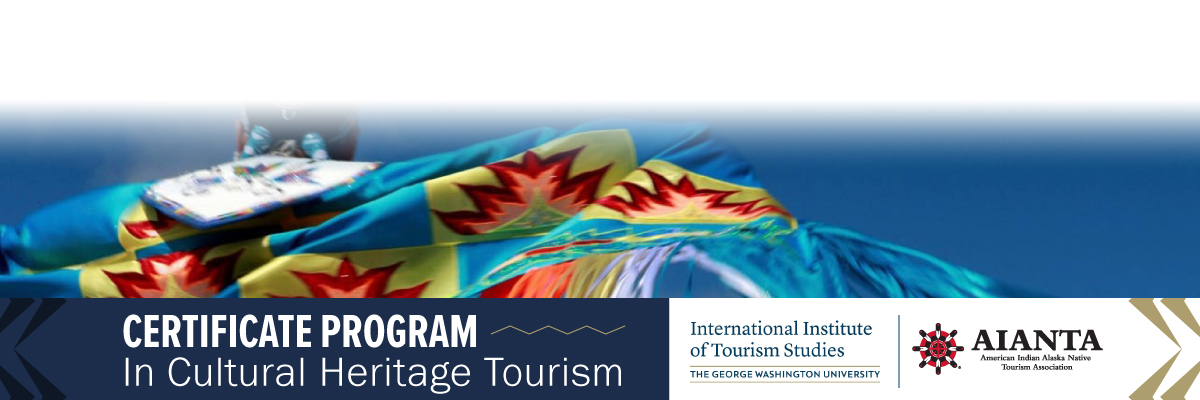
Partnerships can strengthen the development and promotion of cultural heritage tourism
Partnerships can strengthen the development and promotion of cultural heritage tourism. Examples of these partnerships exist throughout the Americas, including one between the National Park Service and AIANTA as well as the recent launch of a tourism incubator program for Indigenous peoples in Costa Rica. This blog post will highlight two other partnerships in relation to Indigenous tourism and how the Professional Certificate in Cultural Heritage Tourism can help students foster partnerships for destination development and promotion in their communities.
AIANTA, in partnership with the George Washington University International Institute of Tourism Studies (GW), offers a professional certificate in cultural heritage tourism. The online program spans seven weeks and equips students from all backgrounds with the knowledge and skills to manage several components of cultural heritage tourism. The development and promotion of cultural heritage tourism may include but are not limited to natural resources, guide services, artwork and other tangible and intangible assets that authentically represent a specific place, people, history and culture.
Partnerships through cultural heritage tourism usually occur after careful consideration and planning with state and federal agencies, industry organizations, destination organizations and other tourism stakeholders. The Indigenous Tourism Association of British Columbia (ITBC) actively pursues partnerships that support the mission, vision and values of Indigenous peoples as well as contribute to sustainable tourism and the economic development of Indigenous communities. In 2019, ITBC and Tourism Vancouver signed a memorandum of understanding to improve collaboration between both entities and enhance their unique perspectives and programs. ITBC and Tourism Vancouver agreed to share expertise and resources to further the common goal of supporting Indigenous communities and entrepreneurs while developing a sustainable tourism economy on Vancouver Island.
In the United States, the South Dakota Department of Tourism has made great strides to develop and promote Native tourism since 2017. One year later, in conjunction with GW and Tribal Nations, the Department of Tourism launched the South Dakota Native Tourism Alliance (SDNTA). In May 2022, the Department of Tourism in partnership with SDNTA released an updated Tribal Nations visitor guide. The South Dakota Department of Tourism is involved in other initiatives devoted to Native tourism, including the Native American Tourism Development and Management Plan, South Dakota 2020–2025.
Partnerships through cultural heritage tourism seek to amplify native voices and ensure Tribal consultation and collaboration. They benefit the economic prosperity and cultural preservation of Native peoples. Now is the time to manage these tourism assets in a responsible and sustainable manner and foster partnerships among Native and non-native entities. The Professional Certificate in Cultural Heritage Tourism can support these efforts.
The program equips students with the knowledge, skills and professional network to identify, develop and promote cultural heritage resources in their communities. Each student will work on a tourism project for the duration of the program in tandem with course instruction and assignments. These projects will stress the importance of business administration, strategy and sustainability in relation to cultural heritage resources. Upon the successful completion of the program, students are encouraged to seek partnerships for the implementation of their tourism projects as a means of financing, marketing or additional planning.
For more information on the Professional Certificate in Cultural Heritage Tourism, please contact Bianca Mitchell, AIANTA Education Manager, or Matthew Ozuna, GW Program Manager. You may also review the written and recorded material on the AIANTA website.
 Matthew Ozuna is the program manager for the Professional Certificate in Cultural Heritage Tourism from George Washington University. He also holds a Master of Tourism Administration with a concentration in Sustainable Tourism Management from George Washington University. Matthew worked with Destinations International, Simpleview and many consulting teams on a variety of tourism projects, ranging from digital marketing and professional development to industry research and destination management. Before graduate school and tourism advocacy work in DC, he worked with political campaigns, cultural heritage organizations and educational institutions in Walla Walla, WA. In his current role with the State of Washington Tourism, Matthew supports destination development and industry education programs for tourism stakeholders across the Evergreen State.
Matthew Ozuna is the program manager for the Professional Certificate in Cultural Heritage Tourism from George Washington University. He also holds a Master of Tourism Administration with a concentration in Sustainable Tourism Management from George Washington University. Matthew worked with Destinations International, Simpleview and many consulting teams on a variety of tourism projects, ranging from digital marketing and professional development to industry research and destination management. Before graduate school and tourism advocacy work in DC, he worked with political campaigns, cultural heritage organizations and educational institutions in Walla Walla, WA. In his current role with the State of Washington Tourism, Matthew supports destination development and industry education programs for tourism stakeholders across the Evergreen State.